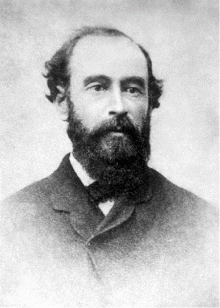John Fall Allison (1825–1897) was a pioneer settler, Justice of the Peace, Postmaster and Gold Commissioner in the Similkameen Country of the Southern Interior of British Columbia, Canada.
John Fall Allison | |
|---|---|
 | |
| Born | 1825 |
| Died | 28 October 1897 (aged 71–72) Princeton, British Columbia |
| Nationality | Canadian |
| Occupation | Gold Commissioner |
Life and career
editAllison was born in Leeds in West Yorkshire, England in 1828.[1][2] In 1837, he emigrated with his parents to the United States.[2] In 1849, he went prospecting in California.[2] In 1858, during the Fraser River Gold Rush, Allison travelled to the Colony of British Columbia and arrived in Vermillion Forks (now Princeton) in 1860.[3] Allison was the first European settler in the area, where he staked gold, copper and coal claims and established the first cattle ranch.[1][3]
In 1862, Allison married a First Nations woman named Nora Yakumtikum, with whom he had four children.[1][3] In 1868, he married Susan Louisa Moir.[2][3][4] Together John and Susan had fourteen children.[3][4]
In 1876, Allison was appointed a Justice of the Peace and became the first Gold Commissioner of the newly created Similkameen Mining District.[citation needed] Allison died in 1897 and was buried at a site overlooking the Similkameen River near a landmark named "Castle Rock".[citation needed]
Allison Pass, through which Highway 3 runs, was named for Allison, as he was the first European explorer to discover the pass.[5]
References
edit- ^ a b c Peter Grauer. "Interred With Their Bones - Names - B1". Peter Grauer. Archived from the original on July 6, 2011.
- ^ a b c d Encyclopedia of British Columbia. "Allison, John Fall and Susan (Moir)". KnowBC. Retrieved June 20, 2011.
- ^ a b c d e "Experience Our History". Town of Princeton. Archived from the original on August 31, 2011.
- ^ a b Parks Canada. "Backgrounder: Susan Louisa Moir Allison". Parks Canada. Retrieved June 20, 2011.
- ^ ABC Books. ALLISON, Susan